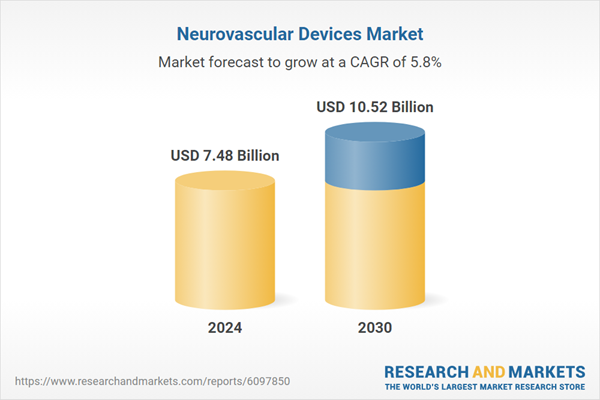Speak directly to the analyst to clarify any post sales queries you may have.
10% Free customizationThis report comes with 10% free customization, enabling you to add data that meets your specific business needs.
Key Market Drivers
Rising Incidence of Stroke and Neurovascular Disorders
The increasing frequency of strokes and related neurovascular disorders is a major force behind the market’s growth. Globally, strokes remain a leading cause of mortality and long-term disability, with over 12 million first-time stroke cases reported each year and around 6.5 million resulting in death, according to the World Stroke Organization. A significant proportion of these cases affect individuals under 70, and even a growing number under 50, underscoring the widespread nature of the issue. This surge in neurological conditions has accelerated the demand for prompt, minimally invasive interventions using advanced devices such as thrombectomy catheters, flow diverters, and embolization coils. These tools are essential for quickly restoring cerebral blood flow and reducing damage, ultimately leading to improved recovery outcomes. Furthermore, increased investment in specialized stroke centers and neurointervention capabilities is ensuring broader access to high-performance devices and timely care.Key Market Challenges
High Cost of Devices and Procedures
The substantial cost associated with neurovascular devices and procedures remains a critical obstacle for the market. Products like stent retrievers, embolization coils, and flow diverters involve complex engineering and premium materials, which contribute to their elevated prices. For example, a Pipeline Embolization Device can cost upwards of USD 27,000, and the comprehensive cost of mechanical thrombectomy per patient often exceeds USD 285,000. These financial demands are compounded by the need for specialized imaging systems, trained professionals, and extended care, further inflating treatment expenses. Access is particularly constrained in low- and middle-income countries, while reimbursement inconsistencies in developed markets can also deter adoption. The financial burden on healthcare systems and patients continues to challenge the broader implementation of advanced neurovascular solutions.Key Market Trends
Rising Adoption of Artificial Intelligence (AI) and Image-Guided Navigation
A prominent trend shaping the neurovascular devices market is the growing incorporation of Artificial Intelligence (AI) and image-guided navigation technologies. These innovations are enhancing diagnostic and procedural precision by enabling real-time visualization and data-driven decision-making. AI systems assist in the rapid interpretation of complex imaging data, improving detection and treatment planning for conditions such as aneurysms and strokes.Image-guided navigation facilitates safer and more effective placement of devices like stents and catheters by offering detailed vascular mapping. The integration of AI with high-resolution imaging technologies - such as MRI and CT angiography - not only supports personalized treatment strategies but also predicts outcomes and identifies risks before procedures begin. These advancements are streamlining workflows, reducing error rates, and promoting better clinical results, while continued investments in AI-driven platforms are expected to further accelerate innovation and adoption.
Key Market Players
- Medtronic plc
- Stryker Corporation
- Terumo Corporation
- Penumbra, Inc.
- Johnson & Johnson Services, Inc.
- Integra LifeSciences Corporation
- Acandis GmbH
- Spiegelberg GmbH & Co. KG
- MicroPort Scientific Corporation
- ZYLOX-TONBRIDGE MEDICAL TECHNOLOGY CO., LTD.
Report Scope
In this report, the Global Neurovascular Devices Market has been segmented into the following categories, in addition to the industry trends which have also been detailed below:Neurovascular Devices Market, By Device:
- Cerebral Embolization and Aneurysm Coiling Devices
- Cerebral Angioplasty and Stenting Systems
- Neurothrombectomy Devices
- Support Devices
- Trans Radial Access Devices
Neurovascular Devices Market, By Therapeutic Application:
- Stroke
- Cerebral Artery
- Cerebral Aneurysm
- Others
Neurovascular Devices Market, By End User:
- Hospitals
- Specialty Clinics
- Others
Neurovascular Devices Market, By Region:
- North America
- United States
- Canada
- Mexico
- Europe
- France
- United Kingdom
- Italy
- Germany
- Spain
- Asia-Pacific
- China
- India
- Japan
- Australia
- South Korea
- South America
- Brazil
- Argentina
- Colombia
- Middle East & Africa
- South Africa
- Saudi Arabia
- UAE
Competitive Landscape
Company Profiles: Detailed analysis of the major companies present in the Global Neurovascular Devices Market.Available Customizations
With the given market data, the publisher offers customizations according to a company's specific needs. The following customization options are available for the report.Company Information
- Detailed analysis and profiling of additional market players (up to five).
This product will be delivered within 1-3 business days.
Table of Contents
Companies Mentioned
- Medtronic plc
- Stryker Corporation
- Terumo Corporation
- Penumbra, Inc.
- Johnson & Johnson Services, Inc.
- Integra LifeSciences Corporation
- Acandis GmbH
- Spiegelberg GmbH & Co. KG
- MicroPort Scientific Corporation
- ZYLOX-TONBRIDGE MEDICAL TECHNOLOGY CO., LTD.
Table Information
| Report Attribute | Details |
|---|---|
| No. of Pages | 183 |
| Published | June 2025 |
| Forecast Period | 2024 - 2030 |
| Estimated Market Value ( USD | $ 7.48 Billion |
| Forecasted Market Value ( USD | $ 10.52 Billion |
| Compound Annual Growth Rate | 5.8% |
| Regions Covered | Global |
| No. of Companies Mentioned | 10 |









